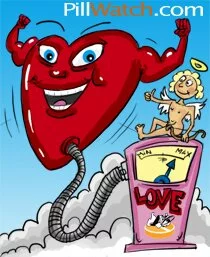
What was the first to appear an egg or a hen? This is a rhetorical question. The same one can be asked about the human organism: what is more important a mind or a heart? Everyone will confirm/ supply his point of view with valid reasons. All the ideas have right to exist.
A lot of people are sure that we live due to our minds, but hearts are the sources of our feelings. Perhaps, love and hate, fear and pleasure have a heart as their home. The discussion may continue. The only undeniable thing is that heart is vitally important.
Disorders in the heart activity have always been seriously treated by all the people. The most vivid sign that something is wrong is angina pain. A person can feel a squeezing, tightness or pressure in the chest, breathlessness, suffocating or choking feeling. Sometimes indigestion is observed. The crushing pain usually strikes across the chest, in many cases though it can go up to the neck and jaw or affect back and arms, which seem to be numb and heavy as if made of iron.
Sometimes the cause of chest pain may lie in the stomach, lung, muscles or ribs disorders as well as asthma and pneumonia. The word angina, however, is used to denote a heart problem. Usually angina pain indicates the exacerbation of ischemic or coronary heart disease. These conditions are caused by the narrowing of arteries, which are blocked by fatty deposits. Therefore, heart muscle cannot get necessary amount of oxygen- and nutrients-rich blood.
There are three types of angina. Stable one is associated with coronary heart disease. It is usually provoked by physical exertion or strain as walking uphill or running (especially after meal). The pain of stable angina usually subsides in several minutes of rest, but it will be back if the exertion starts again.
Unstable angina occurs without any reason (as it seems) for example, if a person is resting. Actually, it happens as a result of a severe narrowing of the coronary artery. This condition is far more dangerous.
Variant angina targets more likely women than men. It is a spasm in the coronary artery, which occurs without warning. This type of heart disorder is more difficult to diagnose.
Such symptoms as dizziness, sweating, racing heart, nausea or fainting report more often about the heart attack, and are not associated with angina pain, which can roughly be defined as the first step to the heart attack.

Some people are more likely to develop angina pain. Usually they are over 60, or they smoke, have diabetes, high blood pressure or cholesterol level, do not exercise or have a history of angina pain in families.
Angina attack can be provoked by physical strain (during exercising) and emotional stress as well as by eating a big fatty meal, extreme weather and fever. The least and the best what we can do to avoid angina attack and prevent the development of angina pain is to change the lifestyle.
Love is as important in our life as health is. I believe, in many cases it can give us strength and protect from problems and diseases. Genrik Senkevich once said realizing that a man is loved can easily win and mitigate his heart. Therefore, we must preserve love in our hearts and, as Rammstein sing Bewaret einander vor Herzeleid, beware each other from heartache.
Ivanna
| Tip for you : Sign-in with Your OpenID and post faster, easier and with easy access to all your past posts. | |
|
Your Nick: |















